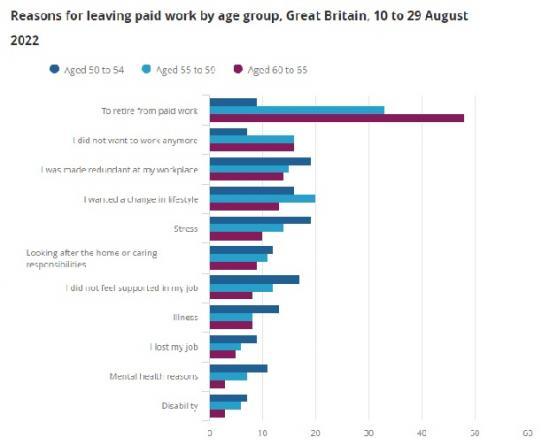Reasons For Workers Aged Over 50 Years Leaving Employment Since The Start Of The Coronavirus Pandemic: Wave 2
28th September 2022

Motivations of those aged 50 to 65 years leaving work during the coronavirus (COVID-19) pandemic in Great Britain from March 2020, why they left and whether or not they intend to return. Main findings from wave 2 of the Over 50s Lifestyle Study.
1.Main points.
In the period from 10 to 29 August 2022, based on adults aged 50 to 65 years in Great Britain (GB) who have left or lost their job since the start of the coronavirus (COVID-19) pandemic and not returned to work:
The majority (66%) owned their homes outright, and were more likely to be debt free (61%) compared with those who left their job since the pandemic and returned to work (42% debt free).
Financial resilience varied by age: those aged 50 to 54 years were significantly less likely to be debt free, excluding a mortgage (49%), compared with those aged 60 to 65 years (62%), and more likely to have credit card debt (39%, compared with 24%).
More than half (55%) of those aged 60 to 65 years were confident or very confident that their retirement provisions would meet their needs, compared with just over one-third (38%) of those aged 50 to 54 years.
Age was also a factor when considering whether to return to work; the younger cohort were more likely to say that they would consider returning to work (86% for those aged 50 to 54 years, 65% for those aged 55 to 59 years and 44% for those 60 to 65 years).
Adults aged 50 to 59 years were more likely to report mental health reasons (8%) and disability (8%) as a reason for not returning to work when compared with those aged 60 to 65 years (3% and 3%, respectively).
Adults aged 50 to 59 years (14%) were also more likely to be currently looking for paid work, compared with adults aged 60 to 65 (6%).
Among those who would consider returning to work (58%), the most important factors when choosing a paid job were flexible working hours (32%), good pay (23%), and being able to work from home (12%).
Among those currently in work, access to support may be a factor in retaining the workforce with those who have never left the workforce more likely to have access to employer support than those who left work.
Around 1 in 5 (18%) said they were currently on an NHS waiting list for medical treatment; this rose to 35% for those who left their previous job for a health related condition.
2.Increase in economic inactivity in those aged over 50 years
Recent Labour Market data has shown that adults aged over 50 years in the labour market continue to drive the increase in inactivity. In May to July 2022 there were 386,096 more economically inactive adults aged 50 to 64 years than in the pre-coronavirus (COVID-19) pandemic period (December 2019 to February 2020).
People experiencing long-term sickness and students have driven the rise in economic inactivity in the latest period compared with the previous three months, with long-term sickness now at a record high.
The Over 50s Lifestyle Study (OLS) was designed to gather more information from adults aged 50 and over to better understand their motivations for leaving work and whether they intend to return. Wave 1 was conducted in February 2022, while this article will look at the results of wave 2, conducted in August 2022.
Throughout this article and unless otherwise stated, we refer to adults aged 50 to 65 years that have left or lost their job since the start of the coronavirus pandemic and have not returned in the reference period.
Estimates in this report are based on data collected between 10 and 29 August 2022 ("wave 2"). Where possible, comparisons are made with data collected between 8 and 13 February 2022 ("wave 1").
4.Age as a factor
Among those who left work since the start of the coronavirus (COVID-19) pandemic and had not returned when surveyed in August 2022 over 3 in 10 (36%) adults left to retire. This was dominated by the older cohort with nearly a half (48%) of aged 60 to 65 years retiring. One-third (33%) of those aged 55 to 59 years, and around 1 in 10 (9%) of those aged 50 to 54 years retired.
Adults aged 50 to 54 years were more likely to leave work due to stress (19%) or not feeling supported in their job (17%), compared with those aged 60 to 65 years (10% and 8%, respectively).
Those aged 50 to 54 years were less likely to be debt free (49%), excluding a mortgage, and were more likely to have lost their job (9%) or be made redundant (19%).
Read the full report HERE
